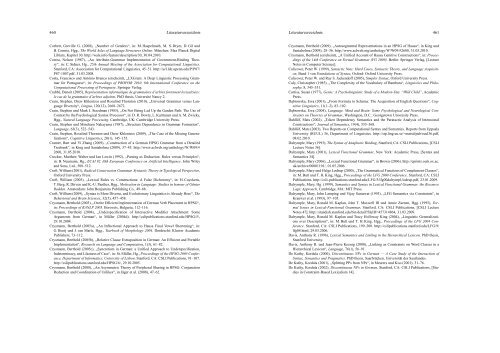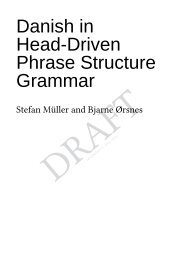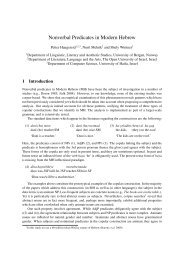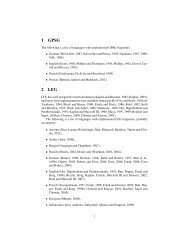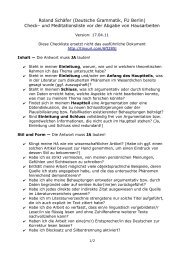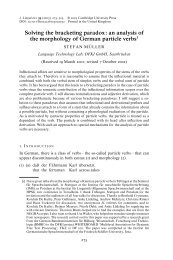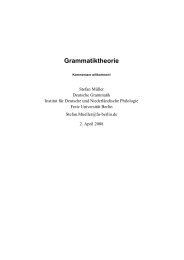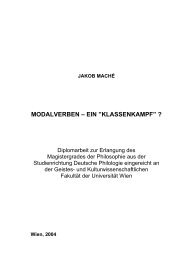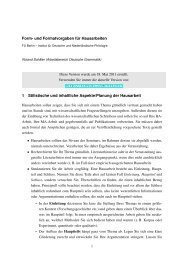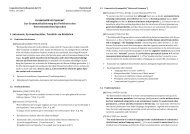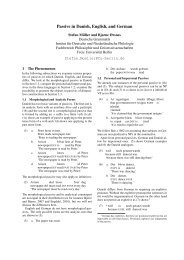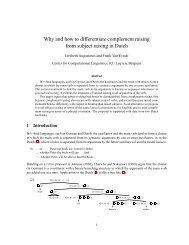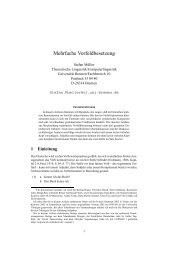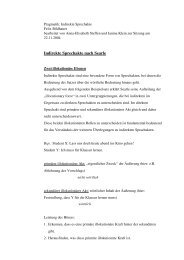Grammatiktheorie - German Grammar Group FU Berlin - Freie ...
Grammatiktheorie - German Grammar Group FU Berlin - Freie ...
Grammatiktheorie - German Grammar Group FU Berlin - Freie ...
Sie wollen auch ein ePaper? Erhöhen Sie die Reichweite Ihrer Titel.
YUMPU macht aus Druck-PDFs automatisch weboptimierte ePaper, die Google liebt.
460 Literaturverzeichnis<br />
Corbett, Greville G. (2008), „Number of Genders“, in: M. Haspelmath, M. S. Dryer, D. Gil und<br />
B. Comrie, Hgg., The World Atlas of Language Structures Online. München: Max Planck Digital<br />
Library, Kapitel 30. http://wals.info/feature/description/30, 30.04.2010.<br />
Correa, Nelson (1987), „An Attribute-<strong>Grammar</strong> Implementation of Government-Binding Theory“,<br />
in: C. Sidner, Hg., 25th Annual Meeting of the Association for Computational Linguistics.<br />
Stanford, CA: Association for Computational Linguistics, 45–51. http://acl.ldc.upenn.edu/P/P87/<br />
P87-1007.pdf, 31.03.2008.<br />
Costa, Francisco und António Branco (erscheint), „LXGram: A Deep Linguistic Processing <strong>Grammar</strong><br />
for Portuguese“, in: Proceedings of PROPOR 2010, 8th International Conference on the<br />
Computational Processing of Portuguese. Springer Verlag.<br />
Crabbé, Benoit (2005), Représentation informatique de grammaires d’arbres fortement lexicalisées:<br />
le cas de la grammaire d’arbres adjoints. PhD thesis, Université Nancy 2.<br />
Crain, Stephen, Drew Khlentzos und Rosalind Thornton (2010), „Universal <strong>Grammar</strong> versus Language<br />
Diversity“, Lingua, 120(12), 2668–2672.<br />
Crain, Stephen und Mark J. Steedman (1985), „On Not Being Led Up the Garden Path: The Use of<br />
Context by the Psychological Syntax Processor“, in: D. R. Dowty, L. Karttunen und A. M. Zwicky,<br />
Hgg., Natural Language Processing. Cambridge, UK: Cambridge University Press.<br />
Crain, Stephen und Mineharu Nakayama (1987), „Structure Dependence in <strong>Grammar</strong> Formation“,<br />
Language, 63(3), 522–543.<br />
Crain, Stephen, Rosalind Thornton und Drew Khlentzos (2009), „The Case of the Missing Generalizations“,<br />
Cognitive Linguistics, 20(1), 145–155.<br />
Cramer, Bart und Yi Zhang (2009), „Construction of a <strong>German</strong> HPSG <strong>Grammar</strong> from a Detailed<br />
Treebank“, in King und Santaholma (2009), 37–45. http://www.aclweb.org/anthology/W/W09/#<br />
2600, 31.05.2010.<br />
Crocker, Matthew Walter und Ian Lewin (1992), „Parsing as Deduction: Rules versus Principles“,<br />
in: B. Neumann, Hg., ECAI 92. l0th European Conference on Artificial Intelligence. John Wiley<br />
and Sons, Ltd., 508–512.<br />
Croft, William (2001), Radical Construction <strong>Grammar</strong>. Syntactic Theory in Typological Perspective,<br />
Oxford University Press.<br />
Croft, William (2003), „Lexical Rules vs. Constructions: A False Dichotomy“, in: H. Cuyckens,<br />
T. Berg, R. Dirven und K.-U. Panther, Hgg., Motivation in Language: Studies in honour of Günter<br />
Radden. Amsterdam: John Benjamins Publishing Co., 49–68.<br />
Croft, William (2009), „Syntax is More Diverse, and Evolutionary Linguistics is Already Here“, The<br />
Behavioral and Brain Sciences, 32(5), 457–458.<br />
Crysmann, Berthold (2003), „On the Efficient Implementation of <strong>German</strong> Verb Placement in HPSG“,<br />
in: Proceedings of RANLP 2003. Borovets, Bulgaria, 112–116.<br />
Crysmann, Berthold (2004), „Underspecification of Intersective Modifier Attachment: Some<br />
Arguments from <strong>German</strong>“, in Müller (2004d). http://cslipublications.stanford.edu/HPSG/5/,<br />
29.10.2004.<br />
Crysmann, Berthold (2005a), „An Inflectional Approach to Hausa Final Vowel Shortening“, in:<br />
G. Booij und J. van Marle, Hgg., Yearbook of Morphology 2004. Dordrecht: Kluwer Academic<br />
Publishers, 73–112.<br />
Crysmann, Berthold (2005b), „Relative Clause Extraposition in <strong>German</strong>: An Efficient and Portable<br />
Implementation“, Research on Language and Computation, 1(3), 61–82.<br />
Crysmann, Berthold (2005c), „Syncretism in <strong>German</strong>: a Unified Approach to Underspecification,<br />
Indeterminacy, and Likeness of Case“, in: St. Müller, Hg., Proceedings of the HPSG-2005 Conference,<br />
Department of Informatics, University of Lisbon. Stanford, CA: CSLI Publications, 91–107.<br />
http://cslipublications.stanford.edu/HPSG/6/, 29.10.2005.<br />
Crysmann, Berthold (2008), „An Asymmetric Theory of Peripheral Sharing in HPSG: Conjunction<br />
Reduction and Coordination of Unlikes“, in Jäger et al. (2008), 47–62.<br />
Literaturverzeichnis 461<br />
Crysmann, Berthold (2009), „Autosegmental Representations in an HPSG of Hausa“, in King und<br />
Santaholma (2009), 28–36. http://www.aclweb.org/anthology/W/W09/#2600, 31.05.2010.<br />
Crysmann, Berthold (erscheint), „A Unified Account of Hausa Genitive Constructions“, in: Proceedings<br />
of the 14th Conference on Formal <strong>Grammar</strong> (FG 2009). <strong>Berlin</strong>: Springer Verlag, [Lecture<br />
Notes in Computer Science].<br />
Culicover, Peter W. (1999), Syntactic Nuts: Hard Cases, Syntactic Theory, and Language Acquisition,<br />
Band 1 von Foundations of Syntax, Oxford: Oxford University Press.<br />
Culicover, Peter W. und Ray S. Jackendoff (2005), Simpler Syntax, Oxford University Press.<br />
Culy, Christopher (1985), „The Complexity of the Vocabulary of Bambara“, Linguistics and Philosophy,<br />
8, 345–351.<br />
Curtiss, Susan (1977), Genie: A Psycholinguistic Study of a Modern-Day “Wild Child”, Academic<br />
Press.<br />
D ˛abrowska, Ewa (2001), „From Formula to Schema: The Acquisition of English Questions“, Cognitive<br />
Linguistics, 11(1–2), 83–102.<br />
D ˛abrowska, Ewa (2004), Language, Mind and Brain: Some Psychological and Neurological Constraints<br />
on Theories of <strong>Grammar</strong>, Washington, D.C.: Georgetown University Press.<br />
Dahllöf, Mats (2002), „Token Dependency Semantics and the Paratactic Analysis of Intensional<br />
Constructions“, Journal of Semantics, 19(4), 333–368.<br />
Dahllöf, Mats (2003), Two Reports on Computational Syntax and Semantics. Reports from Uppsala<br />
University (RUUL) 36, Department of Linguistics. http://stp.ling.uu.se/~matsd/pub/ruul36.pdf,<br />
08.02.2010.<br />
Dalrymple, Mary (1993), The Syntax of Anaphoric Binding, Stanford, CA: CSLI Publications, [CSLI<br />
Lecture Notes 36].<br />
Dalrymple, Mary (2001), Lexical Functional <strong>Grammar</strong>, New York: Academic Press, [Syntax and<br />
Semantics 34].<br />
Dalrymple, Mary (2006), „Lexical Functional <strong>Grammar</strong>“, in Brown (2006). http://eprints.ouls.ox.ac.<br />
uk/archive/00001101/, 01.05.2006.<br />
Dalrymple, Mary und Helge Lødrup (2000), „The Grammatical Functions of Complement Clauses“,<br />
in: M. Butt und T. H. King, Hgg., Proceedings of the LFG 2000 Conference. Stanford, CA: CSLI<br />
Publications. http://csli-publications.stanford.edu/LFG/5/lfg00dalrympl-lodrup.pdf, 23.01.2009.<br />
Dalrymple, Mary, Hg. (1999), Semantics and Syntax in Lexical Functional <strong>Grammar</strong>: the Resource<br />
Logic Approach, Cambridge, MA: MIT Press.<br />
Dalrymple, Mary, John Lamping und Vijay Saraswat (1993), „LFG Semantics via Constraints“, in<br />
Krauwer et al. (1993), 97–105.<br />
Dalrymple, Mary, Ronald M. Kaplan, John T. Maxwell III und Annie Zaenen, Hgg. (1995), Formal<br />
Issues in Lexical-Functional <strong>Grammar</strong>, Stanford, CA: CSLI Publications, [CSLI Lecture<br />
Notes 47]. http://standish.stanford.edu/bin/detail?fileID=457314864, 31.03.2009.<br />
Dalrymple, Mary, Ronald M. Kaplan und Tracy Holloway King (2004), „Linguistic Generalizations<br />
over Descriptions“, in: M. Butt und T. H. King, Hgg., Proceedings of the LFG 2004 Conference.<br />
Stanford, CA: CSLI Publications, 199–208. http://cslipublications.stanford.edu/LFG/9/<br />
lfg04.html, 29.03.2006.<br />
Davis, Anthony R. (1996), Lexical Semantics and Linking in the Hierarchical Lexicon. PhD thesis,<br />
Stanford University.<br />
Davis, Anthony R. und Jean-Pierre Koenig (2000), „Linking as Constraints on Word Classes in a<br />
Hierarchical Lexicon“, Language, 76(1), 56–91.<br />
De Kuthy, Kordula (2000), Discontinuous NPs in <strong>German</strong> — A Case Study of the Interaction of<br />
Syntax, Semantics and Pragmatics. PhD thesis, Saarbrücken, Universität des Saarlandes.<br />
De Kuthy, Kordula (2001), „Splitting PPs from NPs“, in Meurers und Kiss (2001), 31–76.<br />
De Kuthy, Kordula (2002), Discontinuous NPs in <strong>German</strong>, Stanford, CA: CSLI Publications, [Studies<br />
in Constraint-Based Lexicalism 14].


